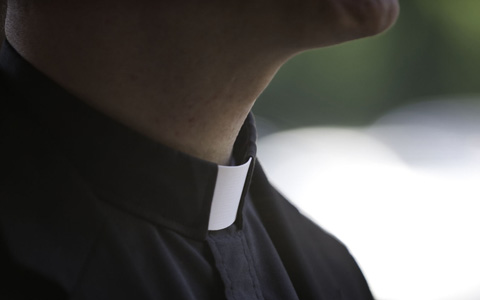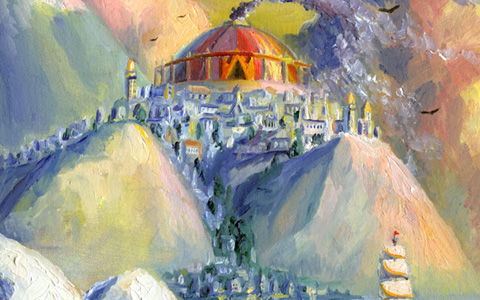
Dear Sister Benedicta Marie,
In scripture Jesus says that if we have faith of a mustard seed we can move mountains. Why aren’t we moving mountains? Does anyone really have that kind of faith?
Dear Friend,
Just to add a little fuel to the fire let me add that in John’s Gospel we also read: “Truly, truly, I say to you, he who believes in me will also do the works that I do; and greater works than these will he do, because I go to the Father”! (John 14:12)
I believe we live in a time when it is particularly easy for Christians of all stripes to be discouraged by what we see around us in society. Also, it is easy to feel that we are not truly honoring scripture as the inspired word of God when we see ourselves and others ignore, skip over or explain away bold passages like these. Perhaps I am misinterpreting you, but I think you are addressing the general loss of faith we see throughout the world? In dealing with your disappointment (or frustration?) you may want to consider the following factors.
Interpreting the Passage
We do not understand a passage of scripture until we first discover the meaning its human author(s) intended to convey. These human authors, referred to in the Catechism as the “sacred author(s)” used most of the literary genre and techniques we are familiar with – and more. The meaning they intended is called the literal sense of scripture. While the literal sense certainly does not exhaust the meaning of any scripture passage, it must always be the starting point for our interpretation (Catechism of the Catholic Church #109-117). All this is simply to say that when an author is using a metaphor he must be understood metaphorically. If the author or speaker is engaging in hyperbole to make a point, it would be unfair (and inaccurate) to interpret his words literally. This is not ‘explaining away’ the passage – this is an honest approach to understanding what we are really being told, and perhaps detaching from what we would like to think we are being told. Moving mountains could, but does not necessarily refer to visible – much less geographic – ‘wonders’.
Interpreting the Will of God
I am usually uncomfortable with people who habitually speak in certitudes about ‘why this happened’, ‘what God is telling us in this’, and ‘what God wants us to do, is,…’, etc. I have checked my pockets untold times and I have yet to find God hiding in any of them. He is just way too big and way too mysterious for me figure out and ‘speak for’ in this manner. Oh, yes, of course – there are a multitude of certainties we do not need to puzzle over – we are all supposed to keep the 10 Commandments all the time. This principle does not need interpretation or nuance. But interpreting for others the meanings and intent of the workings of Divine Providence on a personal or societal level is a profoundly different matter. It is in fact the work of the prophet – and to this role no one calls himself – unless he is a false prophet. God can and does enlighten individuals in very special and specific ways today as he has ever done – but we had better be very cautious about ascribing or expecting others to be divine oracles.
Interpreting the Times
Blessed, and soon to be Saint, John Paul II, spoke of a new springtime for the Church in the future. If his words were indeed prophetic, can we expect what I will call a ‘Resurrection of Faith’ to occur in the world without the prelude to every resurrection, the darkness of the Cross? Is it possible that what we are seeing and feeling in much of civilization is something akin to a ‘dark night’? I would not be the first to speculate in this direction. When a resurrection does occur, it is ‘from the dead’ not from the ill. If some kind of resurrection is really what we want to see (rather than an improvement) then we must be ready to see this resurrection preceded by a corresponding death. No doubt as that occurs – and death can be slow – we will hear any number of ‘anti-prophets’ telling us (again) that God is dead, the Church is dead, and all the rest. Personally I expect it to go on and on. And on. And it is going to be very disheartening because it is going to look so undeniably true. It will in fact be true in every measurable way. But faith is not only about believing what you cannot prove empirically – it is also about staying on the road and on the march while being pelted from both sides with a ton of discouragement.
In sum, moving mountains no doubt refers to very great deeds, miracles quite possibly, but: are you absolutely certain God wants this mountain moved? At this time? To this location? What if this mountain you want moved so badly – what if it stands in our path specifically because we are supposed to be climbing it, not moving it?
Until next time,
Sister Benedicta Marie, O.C.D
Send your questions for Sister to asksister@integratedcatholiclife.org.
If you liked this article, please share it with your friends and family using the Share and Recommend buttons below and via email. We value your comments and encourage you to leave your thoughts below. Thank you! – The Editors
To learn more about the Carmelite Sisters of the Most Sacred Heart of Los Angeles, read their biography in the left-hand sidebar and visit their website (link provided at the bottom of the bio).
We encourage you to support the work of the sisters with your prayers and through donations and planned giving. Click here to learn more..
If you hear God calling you to the religious life, I encourage you to visit their vocations page. – Deacon Mike
Or for more information, please contact:
Sister Grace Helena, OCD, Vocation Directress
920 East Alhambra Road
Alhambra, California 91801














